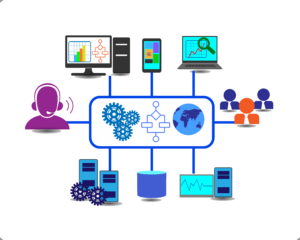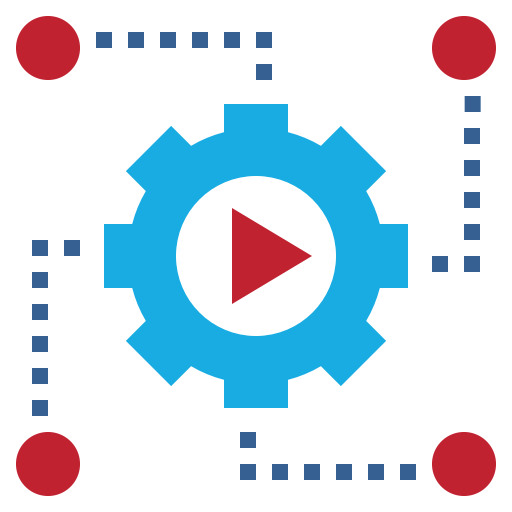In today’s fast-paced digital landscape, automation has become a crucial aspect of streamlining business processes and improving efficiency. Microsoft offers a range of powerful automation platforms to meet diverse needs. From robotic process automation (RPA) to integration solutions and IT process automation, Microsoft has developed several SaaS automation options.
At the onset, Microsoft’s range of SaaS automation options can lead to confusion, as some product messaging fails to align with their intended functionalities. In this blog, we will explore Microsoft’s three automation platforms Power Automate, Logic Apps, and Azure Automation — and delve into what they are and if they are suitable for replacing Microsoft System Center Orchestrator, helping readers understand their unique capabilities and make informed decisions for an organization’s automation requirements.
Power Automate – RPA (Robotic Process Automation) platform
For those unaware of Microsoft’s multiple automation platforms, it would be easy to assume that Power Automate is the sole automation platform offered by Microsoft. This perception arises from the frequent references to Power Automate in various Microsoft and Tech Blogger articles. The reason behind this prominence is that Power Automate is an essential component of the Microsoft 365 (formerly Office 365) product family, which is heavily marketed to its vast customer base.
Power Automate primarily serves as an RPA (Robotic Process Automation) tool with a focus on automating application-to-application data transfer and orchestrating business processes within the Microsoft 365 suite of tools. While it supports No Code – Low Code authoring and can execute scripts like PowerShell and Python, these capabilities are intended for running on a desktop machine using Power Automate Desktop. Power Automate is not designed for remote automation of cloud and on-premises infrastructure, which is a key aspect of infrastructure and IT process automation.
It is important to note that RPA tools, including Power Automate, are not meant to replace System Center Orchestrator as they are not specifically designed or intended for infrastructure and IT process automation. Therefore it is our opinion that, Power Automate does not serve as a suitable replacement for System Center Orchestrator.

Logic Apps – Integration Platform as a Service
While Power Automate is an RPA tool, Logic Apps is an Integration Platform as a Service. It helps automate and orchestrate tasks, business processes, and workflows when there is a need to integrate data across enterprises or organizations. Logic Apps have evolved from the Microsoft BizTalk platform, which is an on-premises business process application.
Logic Apps are created in Azure and consist of a trigger, which, when fired, calls a series of actions and conditions. For example: when a record is received in system A, send an email to a list of email addresses.
Microsoft Azure Logic Apps uses a variety of triggers and actions linked together to construct a process workflow. These triggers and actions are provided by making use of one or more product connectors. Workflows can be constructed to automate business processes linking a wide variety of systems in a graphical browser-based application, but the challenge with Logic Apps is the flow of the automations start at the top and run to the bottom, branching to run different tasks or triggering another Logic App is not practical.
With a large number of business application connectors available, there are a lot of options when it comes to integration, especially when looking to create social linkage (i.e., Twitter, Facebook etc.). For those who have found BizTalk to be effective in on-premises environments, Logic Apps emerges as a suitable choice when considering the migration of such workloads to the cloud.
While Logic Apps does offer No Code automation, the main disadvantages are that Logic Apps does not have the capability to execute on-premises tasks, and there is no on-premises gateway or runbook server equivalent – it is a cloud-first API automation system.
The second drawback is that PowerShell cannot be executed natively within a Logic Apps; instead, a secondary function such as an Azure Functions or Azure Automation needs to be initiated in order to run the script.
Logic Apps does have some useful features and may well make up part of your wider solution, but on its own, it’s not a replacement for System Center Orchestrator.
Azure Automation – Dedicated IT Process Automation as a Service platform
Azure Automation is a cloud-based automation platform that provides an expansive automation service while remaining cost-effective, thanks to both low upfront and long-term running costs. Azure Automation enables users to automate tasks which would typically bog down and occupy IT and service desk personnel’s time.
Azure Automation is compatible with multiple vendors, cloud platforms, and on-premises systems. It is based on and built using the programming language PowerShell and therefore has an extensive reach of integration opportunities.
Thanks to Azure Automation being developed as a cloud platform, deployment is simple and speedy and can be set up worldwide at the click of a button.
The relative costs for using and deploying Azure Automation is very low, as it is charged on a pay-as-you-go model, where costs are only incurred while your automation is executing, and Microsoft actually provides you with the first 500 minutes of ‘execution time’ free. This significantly minimizes your initial outlay to achieve significant automation benefits.
With over 800 Vendor-Supported PowerShell Integration Modules available, there are numerous options for integration covering both Microsoft and other Vendors .products and services.
Azure Automation has all the capabilities of Orchestrator and, being a modern PowerShell-based platform adds new capabilities which are not easily available in Orchestrator, such as; Global Deployment, cross-region resiliency, GIT integration for collaborative working, and change management.
Azure Automation offers users the capability to create graphical PowerShell runbooks, which, when combined with the Kelverion Runbook Studio, provides the familiar No Code – Low Code authoring experience that users have grown accustomed to with Orchestrator.
Overall choice
Microsoft’s automation platforms—Power Automate, Logic Apps, and Azure Automation—offer a diverse range of capabilities, catering to different automation and integration needs. Understanding their unique features and strengths is vital for making informed decisions about the most suitable platform for your business
Whilst Power Apps and Logic Apps have their own strengths and use cases, there are limitations with both platforms. Power Automate excels in creating custom business applications with a low-code approach, while Logic Apps specializes in integrating various systems and services. Depending on your specific automation needs, one of these platforms may be a better fit if infrastructure automation is not the primary focus.
However, in our opinion, Azure Automation is an excellent choice for an Orchestrator replacement when infrastructure, IT process automation and PowerShell integration are key considerations.

About Kelverion
Experts in Cloud, On-Premise and Hybrid automation, Kelverion provide solutions and integrations that remove the manual process tying up IT staff; transforming the productivity, efficiency, and supportability of IT service automation. Our products utilize and enhance the power of Microsoft Azure and System Center Orchestrator.
Working closely alongside Microsoft we have developed our integrations and automation solutions to help bridge the gap between Microsoft’s automation platforms and third-party systems, in the process building key alliance partnerships with multiple vendors to ensure our products are fully certified.
Since 2010, Kelverion has expanded to become a global company, with offices now in the UK, Canada, and the US. Through this, we are able to offer and support products and professional services engagements to enterprise-level organizations no matter where they are.
For more information, to arrange a discovery call or to see a demonstration please contact our helpful team today via info@kelverion.com.




